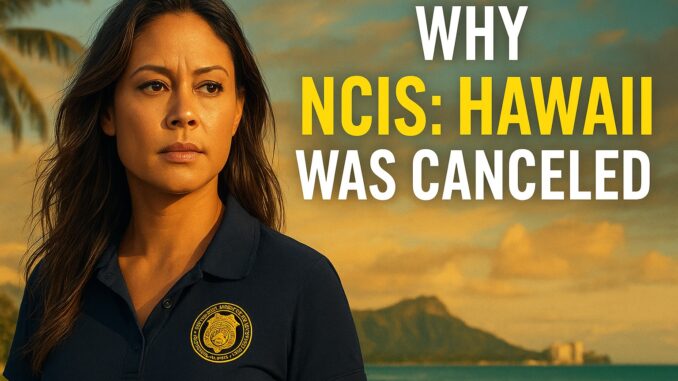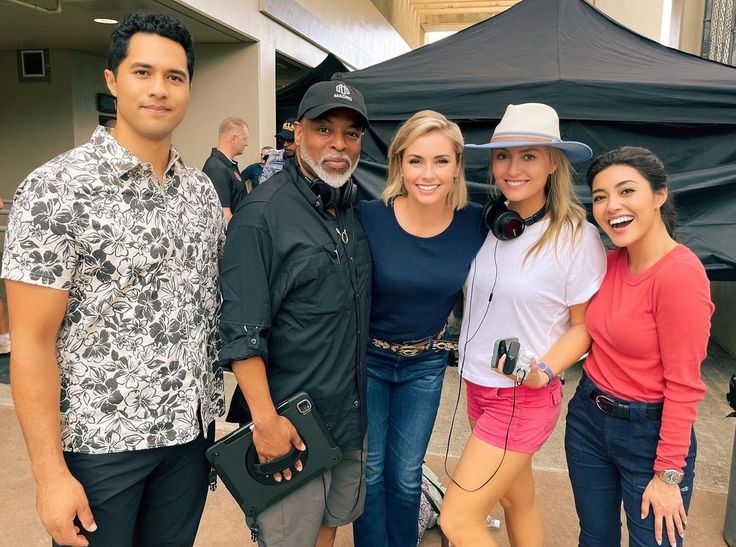
Aloha, Then Goodbye: The Unexpected End of NCIS: Hawai’i
When NCIS: Hawai’i premiered in 2021, it seemed like a bright addition to the long-running NCIS franchise: sun-drenched island settings, a strong female lead, and the military/crime procedural DNA fans loved. Yet, just three seasons later, the series was abruptly cancelled by CBS. Why did it happen? Let’s peel back the layers.
What Was NCIS: Hawai’i? A Quick Refresher
-
Set in Pearl Harbor, Hawaiʻi, the show followed a team of Naval Criminal Investigative Service agents.
-
It starred Vanessa Lachey as Special Agent in Charge Jane Tennant, the first woman to lead an NCIS field office.
-
The series featured agents with diverse backgrounds, and filmed in Hawaiʻi — bringing real island visuals and a unique tone within the franchise.
The Cancellation Announcement — Three Seasons and Out
-
On 26 April 2024, CBS announced NCIS: Hawai’i would not be renewed beyond its third season.
-
The final episode aired on 6 May 2024, serving as both the season 3 finale and unexpected series finale.
-
The abrupt nature left many fans and the production team blindsided.
The Official Reason From CBS – Financials & Schedule
Cost Versus Ratings
-
CBS pointed to “financials and performance overall” as key factors for cancellation.
-
Specifically, filming on location in Hawaiʻi is significantly more expensive than studio-based productions.
-
Even though the show averaged millions of viewers, CBS indicated that ratings alone weren’t enough when weighed against the cost.
Franchise Strategy & Schedule Cohesion
-
The NCIS franchise was expanding — with upcoming series like NCIS: Origins and NCIS: Sydney in the pipeline.
-
CBS indicated a need to keep their primetime schedule “fresh” and maintain strong momentum. Some shows were cut even if they were performing decently.
-
So, the decision may have been less about “bad show” and more about “strategic allocation of resources”.
But Wait – The Fan Perspective: It Doesn’t Add Up
Ratings Were Solid
-
Season 3 of NCIS: Hawai’i ranked ~#16 on CBS with an average of 7.78 million viewers.
-
In many contexts this would be considered healthy — making the cancellation feel suddenly harsh for fans.
Representation & Unique Selling Points
-
The show offered unique representation: a female lead in what had historically been a male-led franchise.
-
It also included LGBTQ+ storylines, including the Lucy Tara & Kate Whistler relationship, which resonated with many viewers.
-
Many fans feel this representation got cut short.
A Cliffhanger Ending — Leaving Fans Hanging
-
The season 3 finale ended on a cliffhanger involving Jane Tennant’s past and her mentor Maggie Shaw, with no resolution in sight.
-
According to showrunners, they didn’t know the show would be cancelled when they filmed the finale.
-
Reddit posts reflect frustration:
“Mostly because Hawaii is very expensive to film in… They likely didn’t see a return on their investment.”
“The cancellation… left me shocked. They filmed the end of the season before knowing they wouldn’t have another season.”
Breaking Down the Key Factors — A Closer Look
Location Costs Are High
Filming in Hawaiʻi carries a premium: transportation costs, island infrastructure, location permits, logistics for cast/crew. Even a well-performing show must justify these added expenses. As one Reddit user put it:
“It cost too much to make.”
Franchise Over-Saturation?
With multiple NCIS spin-offs, there’s a risk of fragmentation or franchise fatigue. CBS may have judged that rather than invest further in Hawaiʻi, it was better to shift to lower-cost or co-production models (such as Sydney) or to a prequel (Origins).
Strike and Industry Disruption
The 2023 writers’ and actors’ strikes impacted production schedules and budgets industry-wide. The third season of NCIS: Hawai’i was shortened to 10 episodes. This kind of disruption tends to shake up network renewal decisions.
Opportunity Cost
Even if the show was performing reasonably, CBS had finite slots and budgets. Keeping NCIS: Hawai’i may have meant sacrificing something else. The business decision: keep what drives higher ROI or lower cost.
What Could Have Been? The Untold Storylines
Jane Tennant’s Backstory
The showrunners had planned to dive deeper into Jane’s past, including her relationship with her mother and her spy/mentor connections.
This arc now remains unresolved.
Lucy & Kate’s Relationship
The LGBTQ+ couple’s storyline was gaining traction and could have become a major pillar of the show’s identity. With the cancellation, this evolution is cut off.
Sam Hanna’s Hawaiʻi Chapter
LL Cool J’s character Sam Hanna (originally from NCIS: Los Angeles) moved to Hawaiʻi in season 3 — some felt this was a setup for fresh dynamics. Then… cancellation.
Why Some Fans Feel It Was a Mistake
-
The show delivered decent numbers yet was still cut.
-
It represented one of the more diverse corners of the franchise — female lead, LGBTQ+ story, location uniqueness.
-
The cliffhanger felt disrespectful to loyal viewers who expected a smoother end.
-
Many believe the cancellation was more about cost/strategy than creative failure.
The Broader Industry Lens – What This Says About TV Today
Ratings Aren’t Everything
In past eras, linear ratings would dictate renewal. Today, streaming numbers, digital viewership, production cost, international rights, tax credits all factor in. Even a show with millions of viewers can be vulnerable.
Franchise Expansion vs. Brand Dilution
Networks are juggling beloved franchises with evolving viewer habits. Spin-offs can saturate a brand. Balancing freshness with familiarity is tricky. Hawaiʻi may have been caught in that tension.
Location Filming Challenges
As productions globalize, filming outside studios can bring authenticity but also higher cost and risk. When budgets are squeezed, these locations often get pared back.
Could It Come Back? A Glimmer of Hope or Just Wishful Thinking?
Fans Tried
Petitions sprang up — one titled “Save NCIS: Hawai’i on CBS” garnered tens of thousands of signatures.
But CBS declined to reverse the decision.
Could a Streaming Platform Rescue It?
There was speculation that Paramount + (CBS’s streaming service) could pick it up, but CBS executives pointed out budget constraints and limited slots.
Realistic Odds
Given the official word and the network’s strategy, a resurrection seems unlikely — though never impossible in today’s “revival” era. But fans should temper hope.
What This Means for Viewers
If you’re a fan of NCIS: Hawai’i, here are a few take-aways:
-
Appreciate the three seasons you got — they delivered strong character work, location charm, and representation.
-
Be aware that the story is unfinished — some major arcs won’t be resolved.
-
Consider shifting your attention to other franchise entries or spin-offs with open-ended futures.
-
Use this as a cautionary tale: even shows you love aren’t immune to network business decisions.

The Legacy of NCIS: Hawai’i
While its run was shorter than many expected, NCIS: Hawai’i leaves behind a meaningful legacy:
-
First female lead in NCIS franchise.
-
Added diversity of story and setting.
-
Connected fans worldwide with its island vibe, military-crime drama, vacation-meets-investigation energy.
-
Sparked conversations about how representation and cost considerations intersect in modern TV.
Conclusion
At its core, the cancellation of NCIS: Hawai’i boils down to the hard realities of television business: location cost, strategic scheduling, franchise management and network finance. While creative merit and decent ratings counted, they weren’t enough to outweigh the expense and the network’s shifting priorities. For fans, the decision felt abrupt — leaving character arcs dangling, setting abandoned, and aloha spoken too soon. Ultimately, NCIS: Hawai’i will be remembered not only for its crime-drama moments in paradise, but also as a case study in how even well-loved shows can end when the ledger says “cut.”
FAQs
-
Why exactly did CBS cancel NCIS: Hawai’i?
CBS cited “financials and performance overall” — meaning the cost of filming in Hawaiʻi, combined with ratings and schedule strategy, led to the decision. -
Was the show performing badly?
Not especially. Season 3 averaged around 7.78 million viewers and ranked #16 for the network. The issue was less viewership and more cost/strategy. -
Did the season 3 finale wrap up the show?
Sadly, no. The finale ended on a cliffhanger, and the crew did not know the show would be cancelled when they filmed it. -
Can the show be revived or picked up elsewhere?
While fans hoped it might move to streaming or another platform, CBS has said there’s no current plan to renew it or bring it back. -
What did this show bring to the NCIS franchise that was unique?
The show offered a female lead in the NCIS universe, strong representation (including LGBTQ+ relationships), and a scenic island setting — all of which set it apart.